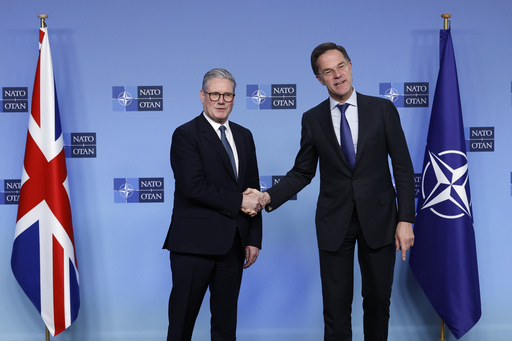BRUSSELS — European Union leaders convened on Monday to discuss potential strategies in response to a significant ally who seems intent on instigating a trade conflict or potentially annexing parts of their territories. This meeting comes after three years of efforts aimed at deterring Russian actions against Ukraine.
Polish Prime Minister Donald Tusk highlighted the absurdity of a conflict arising among allies during a period characterized by overt Russian threats and Chinese advancements. He expressed concerns over U.S. President Donald Trump’s recent bellicose remarks regarding trade policies and military measures, including tariffs on EU goods and a controversial stance on the autonomous territory of Greenland, which is associated with NATO ally Denmark.
Ever since assuming the presidency last month, Trump has openly threatened to impose tariffs on goods imported from the EU, without dismissing the possibility of military intervention to assert control over Greenland. This lack of clarity regarding a viable plan to resolve the ongoing conflict in Ukraine within the promised timeframe has left EU leaders perplexed. Tusk remarked that this situation represents an unprecedented dilemma for European unity, urging for action to prevent “a totally unnecessary and stupid tariff war.”
French President Emmanuel Macron emphasized that the EU is a steadfast power and that if faced with tariffs, the bloc must earn respect. He noted that such threats from Trump could inadvertently unify Europeans in confronting their shared security challenges more proactively. The backdrop of this discussion includes Trump’s prior tariffs on European steel and aluminum, causing EU leaders to engage with Canadian Prime Minister Justin Trudeau due to retaliatory measures taken against U.S. imports.
EU foreign policy chief Kaja Kallas acknowledged the seriousness of the situation, stating the importance of preparation but also warning that “there are no winners in trade wars.” She highlighted that if the U.S. embarks on such a conflict, it would likely benefit China.
Meanwhile, Denmark’s Prime Minister reaffirmed on Monday that Greenland is not up for negotiation and insisted on a strong collective response from the EU if Trump pursues control over the island. Mette Frederiksen remarked that, while she does not support any notion of conflict among allies, a united approach would be critical if the U.S. applies harsh terms on Europe.
Trump had previously broached the subject of U.S. military involvement in securing Greenland, claiming it was essential for national security. Frederiksen expressed her full support from EU colleagues regarding the necessity of recognizing the sovereignty of all nations, affirming that Greenland is an integral part of Denmark and is not for sale. However, she did acknowledge legitimate concerns regarding security in the Arctic, noting the rising activities of both Russia and China in the region.
Frederiksen agreed with American interests in the Arctic and suggested that both the U.S. and Denmark could enhance their collaborative security measures in Greenland. She emphasized the potential for Denmark to bolster its own security presence in the region, indicating a willingness to work together to safeguard their territory.
Recently, her government announced a substantial agreement worth nearly $2 billion aimed at enhancing capabilities for surveillance and sovereignty in the Arctic. This initiative involves the addition of three new naval vessels and increased surveillance resources, including drones and satellite capabilities, according to the Danish Defense Ministry.
NATO Secretary-General Mark Rutte reinforced the notion that collective action in the High North is essential, asserting support for Trump’s perspective on the need to enhance security efforts in the region.
